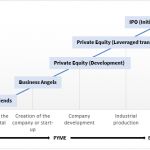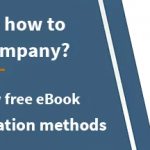[vc_row][vc_column][vc_column_text]Every company has an optimal time to be sold, and it is vital to make an effort to know and be aware of it so as not to regret it later.
As advisors, we start working with a company one or two years in advance of a sale. We prepare it to improve its value, make it more attractive, attract more buyers, increase the probability of success, remove obstacles that would hinder the sale, and minimize the tax impact and equity consequences.
One of the main objectives of the preparation is to identify the critical areas for improvement, act on them, and reduce the potential risks that a possible investor currently perceives. The more attractive you make the company to the investor, the more you can ask for and the more you will receive for it.
|
Index |
Reasons for the sale
There can be many reasons why an entrepreneur would consider the opportunity to sell their business. Here are some circumstances that may make a sale or investor search desirable:
- For personal reasons: The businessowner is preparing themself for retirement, they want to do something different in their life, change of business or increase dedication to other more profitable companies that require more attention, due to health problems.
- For familiar reasons: Disagreements between family members over management, lack of interest or preparedness of children to continue leadership.
- For corporate reasons: Conflict of interest among shareholders, financial investors wanting to exit, different financial capabilities among partners.
- For economic reasons: The company needs a new injection of resources, technological obsolescence, lack of access to growth capital, receipt of a good offer for the company, the value of the real estate assets on which the company operates is higher than the value of the business.
- For competitive reasons: The entry of a powerful competitor, growth, relocation, loss of human capital, the company has maximized its potential in its market, the loss of essential costumers, a stage of peak value in the sector or the appearance of substitute products.
- For legal reasons: There are changes in the sector’s regulatory environment or tax and fiscal policy.
10 Keys to attracting investors
Having listed the circumstances that may lead an entrepreneur to sell their business or to look for investors, it is now necessary to list the ten key points that will help you to attract investors.
1. Understand what you want and what you are aiming for. Our objectives give us direction, but our expectations give us the strength to negotiate.
2. Fail to prepare, prepare to fail. 99% of success is due to preparation. During the process, you must work out the opportunity it represents for the buyer: What are their economic motivations? How much do they expect to earn from your company? What do they want it for? What do they intend to do with
3. Reach an agreement with the “best” alternative investor you have. If you lack alternatives, you lack negotiating power, and the buyer will take advantage of it to get constant concessions. How do you know if that buyer is the right one? Is it the one for whom your company creates the most value or who can pay the most for it? Only a sound methodology for searching for alternatives will allow you to find out.
4. A good negotiator asks a lot, talks little and listens well. Share information, but above all, get relevant information. Ask twice as many questions as your counterpart, request clarification of answers and summarize what they have heard to check that they have understood correctly.
5. A good negotiator builds trust and never lies. They do not create expectations that they will not fulfil and they keep their promises. They earn the respect of the other party during the process because they are reliable.
6. Create the optimal conditions for a good “negotiating framework” before meeting the other side at the negotiating table. Having the right people at the table achieves the above. It would help if you did a mapping of the interests of all the parties involved in the negotiation. Is there anyone who might torpedo the operation because they have other interests? How can they be convinced to help?
7. Identify the actual decision-maker. In addition to the acquiring company’s interests, there are other interests to consider, including those of the people negotiating. You have to find out who is making the decision and their interests, their needs, and what they themselves are looking for. Do they have the authority to close a deal?
8. Show interest in the interests of the other parties. This will make them care more about your interests too, a win-win situation. Building empathy helps to create a favorable climate for negotiations. Be strict in your demands and understanding of the other parties. Negotiation is a game of information, and information gives you power. You should seek to understand their needs rather than their wants.
9. Power is a very relative concept. In negotiation, power will depend on your alternative investors and the alternative opportunities of the other party. Don’t forget that 50% of negotiation is emotion. You must understand and control your emotions towards the talks.
10. A good negotiator can make the pie grow, instead of fighting for the biggest piece. They maximize its value by helping both parties achieve their goal. The first step is to believe that it is possible. Negotiation is an information game, which is why the best negotiators focus more on receiving information than giving it. If you know how to dig deeper into the other party’s needs, you will discover things that are very important to them and do not entail a high cost for you; you can exchange them for things that are essential for you and that have little significance to them.
First contacts with investors
To embark on finding the best investor, the seller must have a team of specialist advisors who can advise and guide them throughout the process and help them make the best decisions. If a seller dares to sell their business without any help, they are likely to fail.
As a professional expert, the advisor makes the first contact with the potential buying company’s decision-maker. This person is usually, depending on the company’s size, the owner, the CEO, the Managing Director or, in larger companies, the Corporate Development Director of the relevant division.
Making a personal contact with an investor is not easy and requires a lot of effort:
- Identify them.
- Know how to overcome filters, be consistent in calls.
- Interest them.
When we speak, we outline the type of transaction you are proposing and why you see it as a precise fit with your company’s competitive strategy without ever identifying the company. If the investor is interested, a blind teaser is sent across.
If there is interest, their reasons for investing are analyzed, and an explanation of their investment capacity is requested. If they are not interested, we also ask why, as this will give us clues as to whether we are approaching the search for investors correctly.
If their response is positive, a confidentiality agreement is sent to you, guaranteeing the proper use of the information to be provided by the recipient.
This stage is slow due to the professional nature and lack of time for discussions and the significant follow-up effort required to get a personal interview with them. One reason for having advisors is that they free up the seller’s workload by taking care of the sales process themselves.
Once the signed confidentiality letter has arrived, and we want to move forward, we arrange a meeting for the delivery and presentation of the sales booklet.
For potential, foreign buyers, we contact them directly. However, we will also provide a blind profile of the company that we are selling to investment banks. Furthermore, we also have relationships within other countries to identify other companies or investors in their areas that we have missed.
The advisory team’s mission is to research potential investors and what their track record has been in other acquisitions: prices, multiples, payment formulas, as well as understanding the strategic rationale for how this acquisition would fit their growth process. It is also essential to answer the following questions: How has their company developed this year? What has been their trajectory and history? In which geographical areas are they present? Who are their customers and suppliers? What is their growth strategy? Knowing how to answer these questions will give us the advantage of being able to improve exposure.
Investors for each stage of a company
Suppose you, as an entrepreneur, are looking for investors. You will need to approach different types of investors depending on your company’s stage of development, as shown in the following image.

- Seed capital:
Seed capital consists of betting on a business idea when there is not yet a business structure. The idea of a new company is the result of an entrepreneur’s fascination, concern or obsession. The usual way to raise capital at this early stage of a new business project is to rely on family and friends. People who trust the founders, who believe in their ability to take their idea forward and are willing to support them and are aware that it is tough to find an investor.
- Start-up:
Start-ups are companies that are starting to function, taking shape and attracting their first customers. In many cases, the founders have put in everything they have, the company is growing, and everyone is demanding more investment. The founders do not have the resources to finance the company’s growth; they have no support from financial institutions as they have no way of providing guarantees and they need investors to put up the money. Otherwise, the company will not be able to continue to grow.
In this situation, when the project is robust and well-executed, new types of investor may appear:
-
- Business Angels: Figures with an increasing presence in our country, usually a former entrepreneur or a private investor committed to investing in start-up business projects, with contributions of between 200,000 and one million euros. The business angel has the scope to achieve a higher degree of diversification with their equity by participating in different projects. In turn, it helps entrepreneurs to have access to a larger pool of funds for growth.
- Pledge funds: These consist of a group of professional investment experts that bring together a few entrepreneurs in an investors’ club. They pay a fee to the club, and the professionals identify and select exciting investment projects.
- Capital development
For a company to pass the start-up stage, at least three years must have passed since its foundation.
The company is now already a reality, as there is a growing business structure. Most commonly, at this stage companies generate less cash than they need to finance their growth. This is a natural phenomenon because companies first have to pay money to source products. To recoup the investment, they will have to sell them and wait to cash out, so the more they grow, the more they have to spend first.
If you do not find investors, your success will be the death of you.
This is particularly serious for companies with a low profit-to-sales ratio, as profits do not cover the funds needed to finance growth, and the more the company grows, the more the cash flow is depleted. If they want to continue to grow, they need investors.
- Family office
It is an office created for the comprehensive management of a family’s wealth: this office takes care of its financial, real estate and business investments, its taxation, its succession, and its general financial planning.
Family groups that have sold companies will be looking to invest in other companies to benefit from reinvestment deductions. If a company has made capital gains on divestment, it will tax at 30% (general corporate tax rate). However, it can reduce this taxation to only 18% (saving tax on 12% of the capital gain) if it reinvests during the following three years in a company, purchasing a stake of more than 5%. This tax opportunity is a clear incentive for family offices to invest in other companies.
- Leveraged transactions on mature companies
During this stage of the company’s life, growth is less pronounced. It is entering a phase of maturity, where it can even comfortably pay out dividends, with stable earnings generation.
At this stage, private equity funds specializing in debt buyouts appear as potential buyers or investors. These are funds that take advantage of the ability to leverage (also called leveraging) the company to offer a higher price to the seller.
Companies that generate stable profits and have little debt are of interest to these funds, as they will use debt as leverage to buy.
They try to put little capital and a lot of debt into the operation by offering as collateral for the banks the future cash flows that the acquired company will bring in. Predictable and recurrent flows are necessary for the bank to lend more money.
NEWCOs (New Company) facilitate purchasing operations.
The importance of having a business structure
The company does not necessarily have to have a closure stage. Once we reach the maturity phase, we must structure it for continuity over time. To sell a company, it needs to have a business structure that allows it to be independent of its owner.
The company must have a life of its own. The founder or owner should be, albeit important, a passenger in the company. Only then does a sale to another group of companies or a management team accompanied by a private equity firm make sense.
This is relevant because, in many cases, the entrepreneur is the company. When they want to sell it, they do not realize that the company is worthless without them, because the entrepreneur themself plays such an important role that they take away the value by leaving.
When this occurs, there are two alternatives if the owner wants to leave the business and give it continuity. Either prepare the company for sale by providing it with a corporate structure or break it up by selling it in parts (machines, warehouses, stock, etc.) and terminating or indemnifying the contracts you have, whether they are labour or business contracts.
About ONEtoONE
At ONEtoONE, we are experts in finding national and international investors, and we know how to locate your best partner. Our investor search team, supported by the best and most comprehensive international databases and analytical capabilities, can identify and contact more than 300 investors worldwide on each transaction. We focus on your company by understanding the aspects that will help you maximize the deal’s price, once we locate those investors with whom you are most comfortable and who best value your company’s potential.
[/vc_column_text][vc_btn title=”Contact us” style=”3d” color=”sky” size=”lg” align=”center” link=”url:https%3A%2F%2Fwww.onetoonecf.com%2Fmerger-and-acquisitions-contact%2F”][/vc_column][/vc_row]






